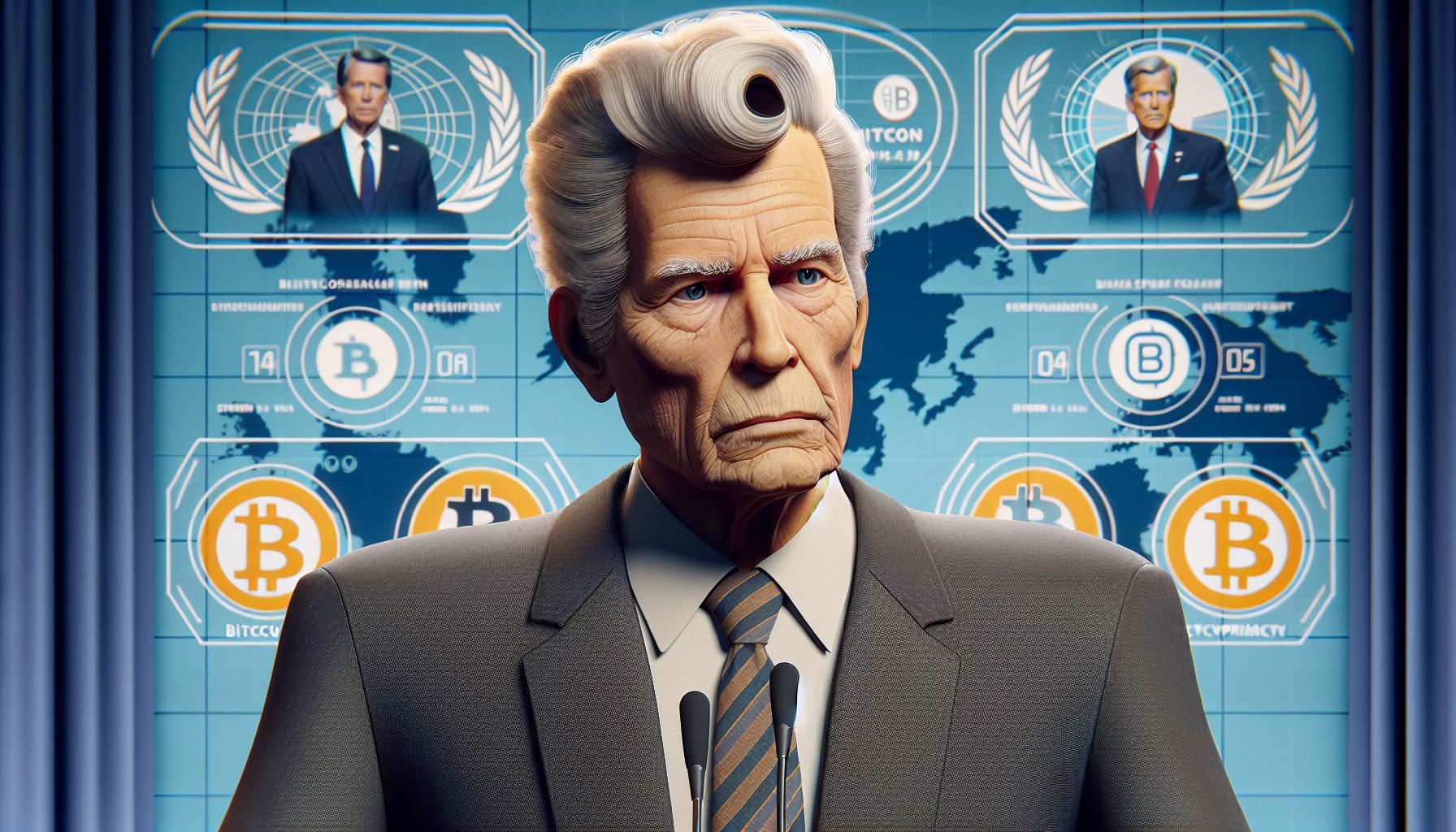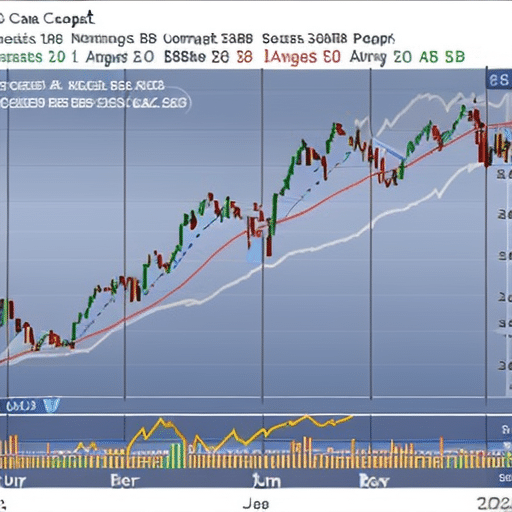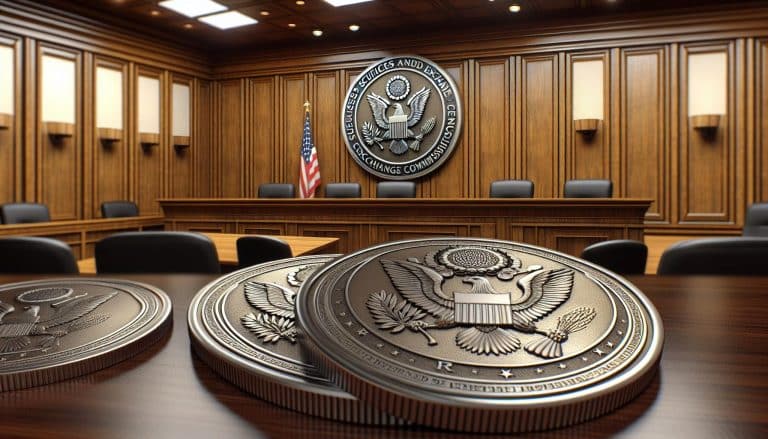Trump’s Bitcoin Views: Impact on Global Crypto
You’ve probably heard about Bitcoin, the digital currency that’s been shaking up the financial world. But have you ever wondered what Donald Trump, the 45th President of the United States, thinks about it? You’re not alone. His thoughts on this cryptocurrency have been a topic of heated discussion.
Trump’s stance on Bitcoin has the potential to influence its future, especially considering his influence in the global economy. So, whether you’re a cryptocurrency enthusiast, a financial analyst, or just someone curious about the intersection of politics and technology, this article is for you. We’ll delve into Trump’s views on Bitcoin and how they might impact its future trajectory. Stay tuned as we unravel this intriguing topic.
Key Takeaways
- Trump’s stance on Bitcoin revealed a fundamental skepticism, emphasizing its volatility and its potential use for illicit activities.
- Despite Trump’s criticism of Bitcoin, the cryptocurrency continued an upward trajectory during his presidency, highlighting the market resilience.
- Statements from Trump sparked heightened global debate about the regulation and classification of digital currencies, potentially influencing their future role in the financial landscape.
- The book, “Trump on Bitcoin and Cryptocurrencies,” illustrates how high-profile views can shape discourse regarding cryptocurrency regulation, showcasing both the resilience and susceptibility of the crypto market to political influence.
- Under Trump’s administration, Bitcoin faced significant regulatory challenges aimed at treating it more like a security or commodity rather than as a currency.
- The public reaction to Trump’s Bitcoin skepticism varied, with the Bitcoin community largely maintaining confidence in the system’s transparency and decentralization feature.
- Compared to other presidents, Trump was notably critical of Bitcoin, while his successor, Biden, adopted a more scrutinous approach focusing on regulatory measures.
- The ‘Trump on Bitcoin‘ narrative has influenced wider political and financial discussions, contributing to the broader acceptance and evolution of cryptocurrencies in the global financial scene.
Trump’s Early Statements on Bitcoin
Throughout his presidency, Donald Trump expressed his thoughts on Bitcoin. These early comments have added significant spark to the ongoing discussion on cryptocurrency’s role and relevance worldwide.
Decoding Trump’s Bitcoin Views
Unearthing Trump’s initial Bitcoin views reveal a fundamental skepticism towards this digital currency. In a tweet from July 2019, he declared his disinterest in Bitcoin, noting its utilisation for unlawful activities due to its high volatility and lack of regulation. Comparing it to traditional fiat currencies, he proclaimed that he is “not a fan of Bitcoin and other Cryptocurrencies, which are not money, and whose value is highly volatile and based on thin air.”
An appearance on CNBC’s Squawk Box in June 2019 further solidified Trump’s less-than-positive stance on Bitcoin. He said, “Bitcoin—it just seems like a scam. I don’t like it because it’s another currency competing against the dollar.”
Please note, Bitcoin’s debut as a mainstream financial asset in the Trump era makes these comments impactful, promoting open discussions about the legitimacy of digital currencies and their potential role in global finance.
Impact of Trump’s Statements on Bitcoin
In the wake of Trump’s Bitcoin-related comments, the cryptocurrency market witnessed temporary ripples. Interestingly, despite his critical Bitcoin stance, the digital currency continued an upward climb on several occasions after his commentaries, proving the resilience of Bitcoin.
The real impact of Trump’s Bitcoin statements, however, rests in the wider conversation they stimulated. His words encouraged increased scrutiny and heightened debate about the regulation and classification of digital currencies—not just in the United States but globally. Active discussions among policymakers, regulators, and global financial institutions emerged, thereby shaping Bitcoin’s future and its role in the financial landscape.
Undoubtedly, Trump’s views on Bitcoin remain a topic of interest among cryptocurrency enthusiasts, financial analysts, and technology-politic intersection followers, triggering thought-provoking dialogue on this revolutionary digital asset. Overall, Trump’s early opinions on Bitcoin have steered open-ended implications for Bitcoin and the wider cryptocurrency market.
‘Trump on Bitcoin and Cryptocurrencies’ Book

In the heart of the crypto-finance intersection stands the book, ‘Trump on Bitcoin and Cryptocurrencies,’ offering an insightful lens into the former president’s views. Despite the absence of concrete stands on either side, Mr. Trump’s beliefs invariably stimulated critical discourse in the domain, as noted in the recent past.
Book Overview and Highlights
This exposé dives deep into Trump’s conceptual landscape, shedding light on his seemingly inconsistent opinions about Bitcoin. While the former president acknowledges Bitcoin’s growing influence, it’s also evident from his comments expressed concern about the volatility of this digital asset. Equally highlighted in the book is the increasing acknowledgment of crypto’s potential misuse for illicit activities.
Interestingly, despite his skepticism, Bitcoin’s value surged, not buckling under his dismissive comments. Policymakers and financial institutions continue to grapple with the question of regulation and classification of digital currencies, a debate fuelled by Trump’s statements.
Insights from Trump’s Perspectives
Peeling back the layers of Trump’s perspective on Bitcoin gives rise to fascinating insights. It’s clear that his stance did little to halt Bitcoin’s meteoric rise, suggesting that market forces may not yield to political rhetoric. The book brings out instances, like the ‘trump coin crypto where to buy’ surge in searches, that indicate the crypto market’s resilience.
Furthermore, it showcases Trump’s influence on the crypto market. While his statements prompted temporary market fluctuations, they, more importantly, stimulated comprehensive discourse among regulators and investors. As a result, the book prompts readers to explore how high-profile opinions like Trump’s shape the future of Bitcoin and cryptocurrencies in the global financial scene.
Equally enthralling is the dialogue this scenario fuels among crypto enthusiasts. The ‘Trump on Bitcoin’ narrative has managed to permeate the financial and tech spaces worldwide, prompting a constant dialogue.
All in all, ‘Trump on Bitcoin and Cryptocurrencies’ proves to be more than a mere chronicle of Trump’s opinions; it offers a window into the evolving landscape of digital finance shaped by political discourse and market resilience.
Trump’s Influence on Bitcoin Regulation
Resolving the complexities of Bitcoin regulation became a critical aspect of the Trump administration’s scope. The subsequent text explores Trump’s influence on Bitcoin control, focusing heavily on his presidency and the subsequent legal battles.
Trump’s Presidency and Bitcoin Regulation
During Trump’s reign, Bitcoin regulation saw significant changes, sparking industry-wide debates affecting the crypto market. Trump spelled out concerns about Bitcoin’s susceptibility to illicit use, often citing its high volatility as a potential economic threat. His remarks had undeniable ripple effects on the crypto market, triggering temporary fluctuations in Bitcoin’s value.
Reports indicate that in 2020 alone, amid Trump’s governance, Bitcoin soared from about 7,000 dollars to nearly 29,000 dollars, underlining the currency’s resilience despite regulatory skepticism. Trump’s opinions, however, served to fuel a necessary discourse on Bitcoin and its impact on the global economy, steering regulatory measures to enhance the stability and reliability of digital currencies.
Legal Challenges for Bitcoin Under Trump’s Administration
Trump’s administration witnessed formidable legal challenges for Bitcoin. His Treasury Secretary, Steven Mnuchin, proposed new regulations that would require crypto exchanges and wallet providers to record personal information of those conducting transactions of more than 3,000 dollars. A move, although criticized by Bitcoin enthusiasts, aimed at governing the often unregulated crypto environment to thwart potential illicit activities.
Such regulations introduced under Trump’s leadership underscore the administration’s perspective of treating Bitcoin more like a security or commodity rather than as a currency. No doubt, these regulatory attempts reflect Trump’s influence and leave a mark in shaping the evolution and acceptance of cryptocurrencies on a global scale.
Public Reaction to Trump’s Bitcoin Views
In the wake of Donald Trump’s expressed opinions on Bitcoin, the impact reverberated through multiple areas, affecting both the Bitcoin community and the broader financial market.
Bitcoin Community’s Response
When Trump vocalized his concerns about Bitcoin’s legitimacy and potential for illicit use, the Bitcoin community wasn’t late to cast its vote. Admirers of Trump’s political station, many were interested in his perspective. Still, the community remained largely unswayed by Trump’s skepticism.
Here, the decentralization principle of the crypto concept reigned supreme. Confidence in Bitcoin remained high, reflecting the underlying trust in the system’s transparency, despite Trump’s negative views. Communities on Reddit forums and Twitter feeds such as #maga, remained ablaze with discourses, standing firm in their confidence in Bitcoin and its functionality. Some even capitalized on Trump’s comments, creating “Trump Coin” with users searching for “trump coin crypto where to buy.
Implications for the Broader Financial Market
The broader financial market, with traditional financial institutions and government regulations playing pivotal roles, took particular notice of Trump’s sentiments. Here, his comments stirred a debate regarding the regulation and classification of cryptocurrencies.
Trump’s concerns matched those of many leading financial players—volatility, the lack of state control, and potential illicit activities. Consequently, Trump’s adherence to these concerns fed into existing anxieties in the financial market.
However, these discussions have shed light on the need for regulation and oversight in the crypto market—an aspect that was previously overlooked. Trump’s influence thus paved the way for debates over whether Bitcoin should be treated more like a security or commodity, which, in turn, plays a massive role in shaping the evolution and acceptance of cryptocurrencies globally.
Through this, Trump indirectly sparked a transition between viewing cryptocurrencies strictly as an investment tool towards acknowledging them as prospective legitimate digital assets. In an era of rapidly digitalizing economies, this shift is vital and will have long-term ramifications on the worldwide acceptance of digital currencies.
Trump versus Other Political Views on Bitcoin
Building on to the investigation into the impact of Donald Trump’s stance on Bitcoin, let’s compare this to other political viewpoints and consider Bitcoin’s place in the broader political sphere.
Comparison with Other Presidents’ Stance on Bitcoin
Unlike his predecessor Barack Obama, who saw cryptocurrencies as an area growing in significant importance, Trump’s perspective mirrored that of traditional financial institutions. Where Obama saw potential, Trump harboured concerns. He voiced his opinions through his extensive following on Twitter, often causing ripples in the market. For instance, when ‘trump on bitcoin’ started trending on social networks, drastic fluctuations in Bitcoin’s price became evident.
However, later presidents, such as Joe Biden, have taken a more cautious approach. Rather than explicitly supporting or opposing cryptocurrencies, there is an emphasis on stringent regulations and extensive scrutiny. This approach translates into a more stable crypto market, less prone to sudden dips and peaks based on political commentary. While Obama acknowledged digital currencies and Trump criticized them, Biden’s angle positions Bitcoin as a security issue, factoring into decisions on international sanctions and regulatory laws.
Bitcoin in the Larger Political Arena
Moving beyond presidents, Bitcoin doesn’t escape the broader political arena’s attention. It’s emerged as a divisive issue. One side champions Bitcoin as a revolutionary financial technology promoting autonomy and reducing government control. The other side, led by traditional financial authorities, seeks to regulate Bitcoin, considering it a potential tool for illegal activities and financial instability.
However, it’s not entirely polarized. Some politicians call for a balanced approach, recognizing Bitcoin’s practical uses but advocating for a reasonable degree of regulation.
Even globally, the political response to Bitcoin is incredibly diverse. Some countries, like South Korea (converting 200000 krw to usd results in a substantial sum in Bitcoin), have adopted Bitcoin with open arms, while others have imposed absolute bans.
In political merchandise, too, Bitcoin found an unlikely ally. MAGA merchandise has become a hotbed for Bitcoin transactions, with the ease of global Bitcoin payments making it an ideal payment method for worldwide #maga supporters.
Overall, as Trump’s influence continues, Bitcoin stays at the forefront of policy debates, proposals, and potential legislation, dramatically impacting the future of digital currencies.
Conclusion
As you’ve seen, Trump’s stance on Bitcoin has been a catalyst for global discussions about the future of digital currencies. His skepticism has mirrored traditional financial institutions, sparking debates that continue to shape the crypto market. On the other side of the spectrum, you have figures like Obama and Biden, whose perspectives on Bitcoin differ significantly, adding to the complexity of the issue.
The world’s reaction to Bitcoin is far from uniform. While some countries are embracing it, others are imposing bans. This variance underscores the ongoing struggle between those advocating for more autonomy and those who seek regulation due to concerns about illegal activities and financial instability.
Bitcoin’s role in political merchandise, such as MAGA transactions, illustrates its potential to influence policy debates and future legislation. This intersection of politics and digital currencies is an area to watch closely as we move forward. It’s clear that Trump’s views on Bitcoin have had a ripple effect, shaping the conversation about digital currencies around the world.
Frequently Asked Questions
What was Donald Trump’s initial perspective on Bitcoin?
Donald Trump was initially skeptical of Bitcoin during his presidency, sparking debates about the digital currency’s legitimacy and role in global finance.
How has Bitcoin’s value responded to Trump’s views?
Despite Trump’s skepticism, Bitcoin’s value continued to rise, triggering discussions around its regulation and classification on a global scale.
How has Trump’s viewpoint on Bitcoin impacted the financial market?
Trump’s perspective, aligning with traditional financial institutions, influenced debates regarding regulation and oversight in the crypto market, impacting its global evolution and acceptance.
How does Trump’s stance on Bitcoin compare to other political figures?
Trump’s skeptical stance contrasts with ex-president Barack Obama’s more open outlook and current president Joe Biden’s cautious approach.
What’s the split in the political sphere regarding Bitcoin?
There’s a division between those advocating for Bitcoin’s autonomy and reduced government control and those seeking its regulation due to concerns about illegal activities and financial instability.
How have different countries reacted to Bitcoin?
The international reaction to Bitcoin varies widely, with some countries welcoming it, while others impose bans due to varying reasons.
What is Bitcoin’s role in political merchandise?
Bitcoin has also featured in political merchandise transactions, like MAGA sales, illustrating its influence on policy debates and prospective legislation.






 Bitcoin
Bitcoin  Ethereum
Ethereum  Tether
Tether  XRP
XRP  USDC
USDC  Wrapped SOL
Wrapped SOL  TRON
TRON  Lido Staked Ether
Lido Staked Ether  Dogecoin
Dogecoin  Figure Heloc
Figure Heloc  Cardano
Cardano  WhiteBIT Coin
WhiteBIT Coin  Bitcoin Cash
Bitcoin Cash  Wrapped stETH
Wrapped stETH  Wrapped Bitcoin
Wrapped Bitcoin  USDS
USDS  Wrapped eETH
Wrapped eETH  Binance Bridged USDT (BNB Smart Chain)
Binance Bridged USDT (BNB Smart Chain)  Chainlink
Chainlink  LEO Token
LEO Token  Zcash
Zcash  Monero
Monero  WETH
WETH  Stellar
Stellar  Coinbase Wrapped BTC
Coinbase Wrapped BTC  Ethena USDe
Ethena USDe  Hyperliquid
Hyperliquid  Litecoin
Litecoin  Canton
Canton  Avalanche
Avalanche  Sui
Sui  Hedera
Hedera  USDT0
USDT0  Dai
Dai  sUSDS
sUSDS  Shiba Inu
Shiba Inu  Toncoin
Toncoin  World Liberty Financial
World Liberty Financial  Uniswap
Uniswap  PayPal USD
PayPal USD  Cronos
Cronos  Ethena Staked USDe
Ethena Staked USDe  USD1
USD1  Mantle
Mantle  Polkadot
Polkadot  Rain
Rain  MemeCore
MemeCore  Bitget Token
Bitget Token